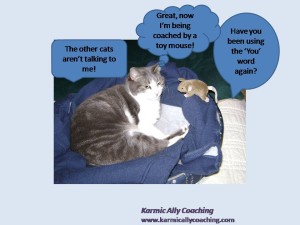This post has already been read 4200 times!

In my post on building a positive reflex for career success, I shared the fact that while co-workers and bosses gave Gravitas a 67% score in evaluating Executive Presence, Communication or how we speak accounted for 28% of the score.
I’ve gone further into the need of a powerful vocabulary for exuding Executive Presence and a Professional Brand and covered some of the words that one should avoid.
But there’s more to our words and how we use them to communicate than we might realize.
Effective communication lies at the heart of assertive behavior and using your Signature Voice raises your presence.
Apart from your body language and tone of voice, the use of wrong words, or ‘poison phrases’ can alienate people for a lifetime.
One such word is using ‘You’ when communicating unless the intention is to alienate the other person.
Ever considered if you are inadvertently alienating people with the ‘You’ word?
How the You word wrecked agonizing havoc for a little girl

This is a real story about how ‘You’ created a lot of problems for a young girl.
Years ago, when my sister and I were at residential school, there was a student in my sister’s group – not because of any shared interests but simply because this set of students had joined school and grade at the same time and were yet to completely integrate with the class which had known each other since nursery.
The student who shall remain nameless managed to alienate the other members of the Group and damage control took place much later during Founder’s Day when her Mom came to the school and helped mend fences.
The girls called her a bully and rude. Her favorite phrases were full of ‘You’ and words like angry, irritate and annoy. Her conversations went along the lines of
Alka, you irritate me
Arti, you annoy me
Bhavna, you make me angry
And then walking away without giving the recipient of the message a chance to talk.
The first few times it happened with my sister, I told her to let it go. Maybe her friend was upset and not able to express herself. Then I told her to seek clarification, similar to Fogging the Critic or one of my favorite approaches to get specifics by Stun Gunning the Meanie.
The tactics didn’t work. Each time, her friend walking off in a huff.
Shortly after, I observed the girl was lonely and lost. She was labeled Aggressive and nobody wanted to talk to her or even sit with her at the dining table until the Founder’s Day event where parents are invited. Her Mom along with the other parents did the needful to facilitate the patch up.
When I look back, I realize she might have been overly assertive and her words did not quite communicate her message the way my pet friend Miss Coco, who’s an effective communicator extraordinaire does.
Had she moderated her words, this post might have had a different angle.
Assertive phrases are always better for effective communication

Assertiveness means being honest & calm and comes from a place of respect and trust.
It means communicating your viewpoint whether in words or deeds from a place of self-assurance, not fear of the other or the desire to dominate.
It means being mindful of what you are saying or doing and owning your communication.
We often don’t realize the effect that our words have on others or how it makes them feel. So in this case, when the girl was saying, for example, “Arti, you annoy me”, she made Arti feel confused and left wondering what she had done wrong.
Such phrases are also called “poison phrases” for the damage that they cause. A better way to get the same message across is to clarify the verb being used and the use of “I”. In other words, express how YOU are feeling. So to rephrase
When you pick your nose Arti, I feel annoyed
Leave room for dialogue, it helps in the long run.

Other assertive tips include being specific and not making sweeping generalizations. So be mindful of using words like always and never. Be honest and accurate; give examples of a specific behavior.
Honest and accurate descriptions also go a long way to maintain relationships. In the student’s case, her ex-friends judged her based on her behavior and labeled her aggressive.
Instead of having judged her, an honest and accurate description of her behavior which could have mended fences earlier would have been “she makes hurtful comments when we talk.”
Ever put your foot in your mouth and alienated friends with the word ‘You’? If the answer is yes, then try out the tips for size and come back to share your experience.
Talking of vocabulary and assertiveness, are you demonstrating Executive Presence. Download Karmic Ally Coaching’s Executive Presence Checklist and mini ecourse here or by clicking the below image. It’s on the house!
Written by: Vatsala Shukla
UHY2H9954466
Photo Credit: Cat and Mouse by Vince Mig




 I adhere to the Certified Coaches Alliance Code of Ethics and Standards. A copy is available on request.
I adhere to the Certified Coaches Alliance Code of Ethics and Standards. A copy is available on request.
 Let's Talk through the Connect Form:
Let's Talk through the Connect Form:
Thanks for the powerful reminders Vatsala. It is so true that our words have a powerful impact on people and once we “unleash” them, it is difficult to take them back.
You’re welcome, Pamela. There is merit in the saying ‘think before you speak’. 🙂
Our words do have power, don’t they? This is a wonderful reminder for communicating with others and relaying the intended message. Thank you for sharing your insights and wisdom, Vatsala.
Our words do have a lot of power, Cindy, and one that we need to use wisely.
Great stuff here. There’s lots to chew on and digest. I wonder how many of us do this and don’t even realize it. Thank you for sharing.
We’ve lost the art of face-to-face communication in this country. We need to relearn it.
I agree, Barb.